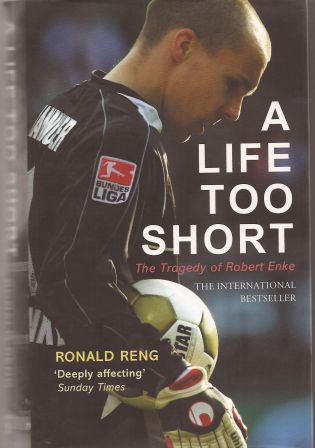If I had to choose between my wife and my putter... well, I’d miss her.
A life too short
Return to the book list for this category.
A life too short. The tragedy of Robert Enke, Ronald Reng, London, Yellow Jersey, 2011. ISBN 9780114091657
Robert Enke started the 2009-10 season as Germany’s Number 1 goalkeeper with a World Cup at the end of it. Before it was over he had taken his own life. The death of his daughter, the pressure of professional football were factors but not the cause.
The book is a very moving account of how Robert Enke battled with depression throughout his life. He explained it to a team-mate: “Depression kills all positive feelings. Suddenly everything strikes you as pointless, hopeless”. The result was that he was paralysed: “I feel helpless and anxious, I don’t leave the hotel room, I’m afraid of people’s eyes. I’d just like to live without anxiety and nerves”.
What made the problem unbearable was not being able to talk about it: “In our achievement-oriented society a goalkeeper, the last bastion in defence, can’t be a depressive. So Robert summoned up a huge amount of strength to keep his depression secret. He locked himself away in his illness”.
He lived in fear, wonderfully summed up in the phrase “the fear that someone would expect something from him”.
As a precocious teenager he was picked at 16 for the under 18s but struggled to come emotionally, afraid he might disappoint people.
He was the number 2 goalkeeper in the European Championships in 2008. He was part of the squad, he even got a medal but did not have the stress of having to play. His wife said of this period, “‘He was in a dazzlingy brilliant mood during the European Championship”. Any other goalkeeper would have been champing at the bit.
He played one game when he conceded three goals from crosses that he should have come out for. The recurring nightmare of that match lasted for years repeatedly threatening to ruin his self-confidence.
At times he makes very profound comments. In one of his better periods he commented: “Football turns you into someone who always wants more, who’s never content,’ he said. Over the past few months he’d learned to be grateful for what he had”.
He was an outstanding goalkeeper; Alex Ferguson phoned him in person to try to persuade him to join Manchester United. The book describes him as “what the British call a ’goalkeeper’s goalkeeper’ – one who is revered by his colleagues but whose value the masses don’t fully appreciate”. He studied goalkeepers intently modelling himself on Oliver Kahn and Edwin van der Saar. He was “the mid-point between Kahn and van der Sar, between reaction and anticipation, between conservative play and risk. The middle way often seems boring and is usually sensible”.
A close friend and fellow player Marco Villa, said of him: “Robbi felt walled in,’ says Marco Villa. He had these two great dreams: to play the World Cup and to out himself as a depressive. And he knew that both weren’t possible: one definitely excluded the other. He felt that regardless of what he did he couldn’t get over the wall around him.”
This is a disturbing book. It raises issues that made me uncomfortable. The tragedy of Robert Enke is that the culture of professional sport made it impossible for him to admit his problem and get help.

